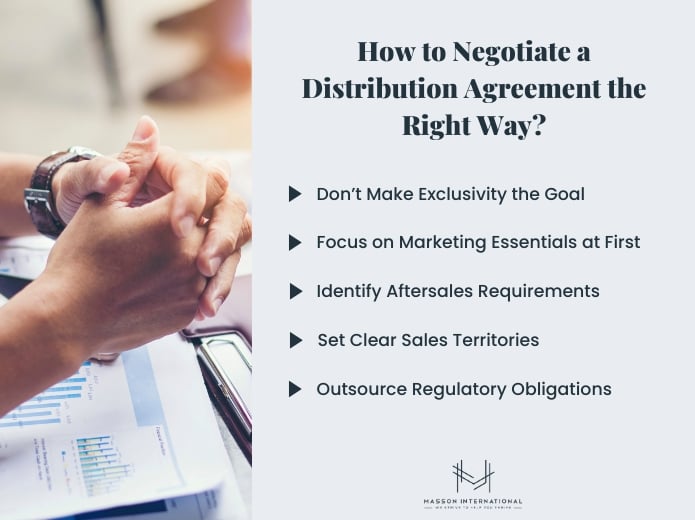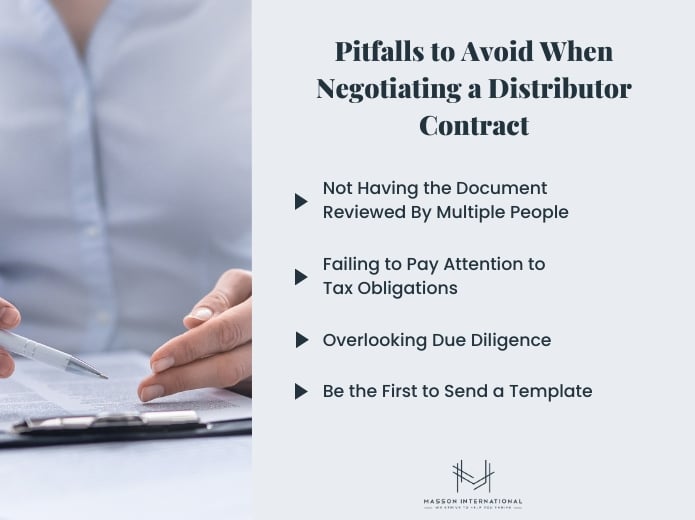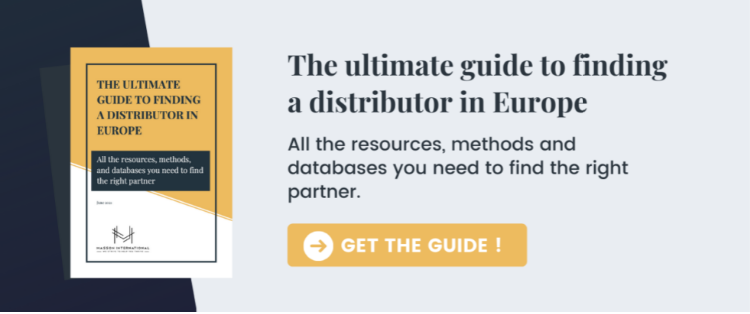Business leaders rely on distribution agreements to expand their operations and reach new markets. But negotiating them can be extremely difficult. There are always two sides to any contract that need to be appeased — not to mention plenty of special legal considerations to keep in mind throughout the process. This article will review those challenges and provide tips for successful distributor contract negotiations.
What Is a Distribution Agreement?
A distribution agreement is a contract between two parties, often referred to as the supplier and the distributor. The agreement outlines the details of each party's responsibilities and the terms of their collaboration. Generally, the supplier is responsible for manufacturing and selling products while the distributor is responsible for carrying and marketing the product to retailers or customers in their locality.
What Should a Distribution Agreement Include?
Distribution contracts can vary from situation to situation, but always cover the same fundamental bases, including provisions for:
- Pricing: This outlines the pricing and payment terms for the products being sold, as well as any discounts or incentives offered by either party.
- Payment Terms: This section specifies when payments are due, how they will be made, and any associated fees.
- Minimum quantities ordered/sold – Sales Goals: This clause can force the distributor to sell a minimum yearly quantity. It can be part of an Annex to the document that is signed and updated each year if you need to adapt sales goals (if the local laws admit it).
- Territory Restrictions: These restrictions identify any geographic limits pertaining to the agreement, such as which countries or regions the distributor is authorized to distribute to.
- Contract Term: This refers to how long the agreement will remain in effect and any conditions that can terminate the contract.
- Exclusivity Rights: This section specifies whether the supplier or distributor will have exclusive rights to distribute or sell products in certain regions. In cases of distributor exclusivity, the distributor is the only business in its locality with the permission to purchase from the supplier. Supplier exclusivity restricts distributors from going to other suppliers and means they must only buy from the contracted party.
- Reporting Requirements: This outlines any reporting requirements for the distributor, like when and how often reports should be made to the supplier detailing the number of units sold.
By outlining these and other details, a distribution agreement helps ensure that both parties know their rights and responsibilities throughout the duration of their collaboration.
How to Negotiate a Distribution Agreement the Right Way
Sales agreement negotiation can be a notoriously difficult process, as there are two powerful sides to every arrangement, and each wants an advantageous outcome. Success depends on collaboration from both parties, as well as a proper strategy.
Here are a few best practices to keep in mind when negotiating a distribution agreement:
Don’t Make Exclusivity the Goal
Avoid aiming for exclusive sales rights at first if you can. Incentivizing exclusivity with discounts or product improvements is often a more successful way to obtain it.
Focus on Marketing Essentials at First
Don’t try to tackle every area of marketing from the beginning. Focus on areas with clear, achievable goals and objectives. Once these are accomplished, you can then move on to more complex topics.
Identify Aftersales Requirements
This often gets overlooked during negotiations, but after-sales requirements should be outlined. These can include anything from warranties to product returns and refunds.
Set Clear Sales Territories
Make sure that both parties understand exactly which countries, regions, and/or cities will be covered by the agreement before it is signed. This helps avoid potential conflicts down the line.
Outsource Regulatory Obligations
If possible, have a third party handle any regulatory obligations. This ensures that the supplier and distributor can focus on marketing, selling, and shipping without having to worry about legal compliance.

Pitfalls to Avoid When Negotiating a Distributor Contract
While the steps outlined above seem simple enough, following them won't guarantee a successful outcome.
In addition to best practices, there is also a number of distributors that fail to avoid during negotiations.
Here is a look at some of the most common:
Not Having the Document Reviewed By Multiple People
Any contract — whether it be for distribution or any other agreement — should be thoroughly reviewed by multiple parties prior to finalization.
All too often, companies choose to either have their sales manager or lawyer exclusively sign off on documents without obtaining proper input from the other side of the dynamic. This often results in a final distribution that is commercially viable but not legally sound, or legally sound but not commercially viable.
To have one that is both, it is important to involve legal and commercial personnel in the review process.
Failing to Pay Attention to Tax Obligations
Tax laws vary from country to country, and failure to pay attention to them could have serious consequences. Before signing a distribution agreement, both parties should be aware of the applicable tax laws in their respective jurisdictions.
Overlooking Due Diligence
Proper due diligence is essential to any business transaction. It is especially important when it comes to negotiating a distribution agreement, as it will help mitigate any potential legal or financial risks. Companies should research their potential partners’ financials, legal history, and customer reviews before signing any documents.
Be the First to Send a Template
Shoot first, talk later. In most cases, the party which drafted the initial template from which the negotiation derives will probably have the upper hand. Share the template you created with your best terms in mind, and then negotiate the clauses. Most people don’t want to complain about all the clauses, they pick the first few they are most bothered by. This is your chance to get what you want on most of the topics.

Conclusion
Distribution contracts play an important role in scaling any company. By making sure you understand them, you can protect your business and ensure successful collaborations with its partners for many years to come.






